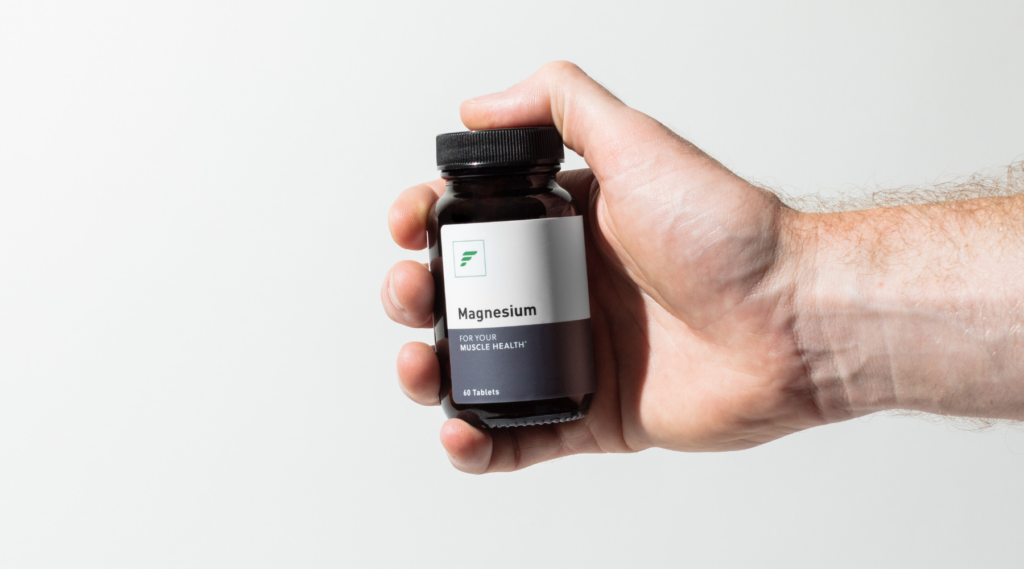Magnesium

Why do we need Magnesium?
Magnesium is a mineral involved in many processes in our body. It regulates the nervous system and the contraction of the muscles, and it plays a role in our protein and DNA synthesis as well as the structural development of bones (1).
A magnesium deficiency is not uncommon among the general population. Its intake has decreased over the years especially in the Western world where foods rich in energy and poor in micronutrients such as sugary and processed foods are often consumed.
Low levels of magnesium can also be caused by either reduced absorption of magnesium in the gut itself or increased excretion of magnesium in urine. This can be the cause for people with digestive issues, chronic alcohol use or due to certain health conditions like type 2 diabetes (2).
If you lack magnesium, this can have a negative impact on your energy levels, sleep, muscle recovery and mental wellbeing. Signs of a magnesium deficiency can include loss of appetite, feeling fatigued and weak, tremors and muscle cramps (1).
Food sources of magnesium.
- Green leafy vegetables (Spinach, Kale, Broccoli, Cabbage)
- Legumes (Peas, Beans, Lentils, Chickpeas)
- Nuts (Almonds, Cashews, Peanuts)
- Seeds
- Whole grains
- Dairy products
- Fatty fish (Salmon)
- Fruits (Bananas, Dried apricots, Avocados)
- Fortified cereals
What is the Nutrient Reference Value of magnesium?
375 mg a day (3).
For who do we recommend a supplement?
People who consume high amounts of alcohol, have a restricted diet, or have specific medical conditions (inflammatory bowel diseases), often have higher magnesium needs and a supplement might be advised.
Having a magnesium deficiency can be a cause of muscle cramps and therefore magnesium supplements are often marketed to help with this. However, based on clinical research it is unlikely that magnesium supplementation provides effective treatment for muscle cramps (4).
Magnesium is involved in the production of serotonin. Serotonin is a hormone that plays a key role in our mental health and mood. The results of a systematic review show that magnesium supplementation can play a possible role in the prevention of depression (5).
There is strong evidence that magnesium deficiency is more prevalent in migraine sufferers. This may be due to genetic inability to absorb magnesium or excretion of excessive amounts of magnesium due to stress (6). A meta-analysis confirmed that oral magnesium supplements alleviate the frequency and intensity of migraines (7).
As we age, age-related changes like circadian rhythms, environmental and lifestyle changes or a decreased nutrient intake and/or absorption can increase the risk for insomnia. Magnesium causes certain natural biochemical actions which have a relaxant effect and facilitate sleep. Supplementation of magnesium appears to improve insomnia in elderly people, which could also be extended as a helpful aid to the general population as intakes below 400mg/day are safe (8, 9).
FFF Supplement Dose.
1 tablet provides 50 mg.
Serving size: 1-2 tablets a day.
Why choose supplements from Fresh Fitness Food?
A study that compared multiple forms of magnesium supplements, data suggested lower bioavailability of magnesium oxide, with significantly higher absorption and bioavailability of magnesium citrate (8).
When it comes to our health, the food we put in our bodies can have a significant impact in many ways. It affects our mood, energy levels, stress, physical activity and everything in between. The right nutrition can help us to feel better, every day. At Fresh Fitness Food we believe in a food-first approach as food provides you with so much more than just nutrients. Many of us should be able to get most nutrients from a healthy and balanced diet, however, there are some caveats and exceptions where food supplements can assist to fill up the gaps.
Magnesium supports muscle function, sleep, and mood. Key benefits of magnesium include its role in serotonin production and its potential to ease migraines and signs of insomnia. It’s also linked to stress relief. Pairing a balanced diet with healthy meal delivery can help maintain optimal magnesium levels with ease.